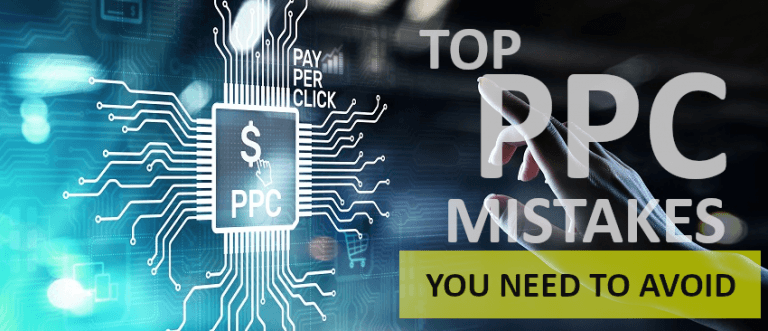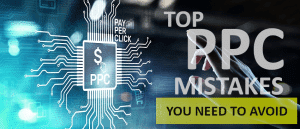Pay-per-click (PPC) marketing campaigns have helped some businesses boost their online marketing exponentially. This is likely because 86% of consumers use search engines to find local businesses. And 65% of consumers who are ready to buy click on paid ads in the Google search engine results pages (SERPs).
However, if you truly want to reap the rewards it can offer, then you have to avoid making common mistakes in your PPC management. In this article, we’re going to go over some of the top mistakes you should avoid with pay per click advertising.
So let’s get to it!
Not Having a Designated Landing Page

Well, if the destination you send them to isn’t related to the ad in the least bit, then chances are they’re going to leave. And this will send your bounce rate soaring through the roof and your conversion rate plummeting into the ground.
In many cases, this happens when brands send their ad clickers to their homepage. This is the most generic place you can send a consumer who’s interested in buying the product or service you’re advertising in your ad.
Make sure you’re sending your ad traffic to a specific landing page that’ll provide them with more information and more calls to action to drive them to the next step of the buyer’s journey.
Using Your Contact Page as the Landing Page
At first thought, you may believe that your contact page is a great next step for ad clickers. However, you have to keep in mind that these interested parties may not be ready to buy or reach out to your brand.
Again, having a landing page that hones in on the benefits of your product or service is a better option because it prepares them to make a buying decision. Then within this page, you can include links to your contact or product/service page.
Not Split-Testing Your Ad Copy

This is why it’s critical to have A/B split-testing in place. By doing so, you can pinpoint what works and what doesn’t, so you can duplicate your success. Just make sure that you have small changes in your copy so that it’s easy to determine what changes cause a boost in conversions.
Not Making Use of Negative Keywords
Although PPC ads are considered paid search and contrast with organic SEO, it still requires optimization. The keywords you use will help determine your position in the ad space within the SERPs.
However, the keywords you use shouldn’t only focus on the keywords you want to rank for. But include negative keywords you don’t want to rank for.
For instance, if you’re a “residential remodeler,” you could include “commercial” as a negative keyword so that you don’t show up in the results for “commercial remodeler.”
Including negative keywords in your campaigns is an excellent way to make PPC management a lot easier. Plus, it’ll prevent you from going over your monthly marketing budget.
Targeting Overly Broad Keywords
Here’s a common mistake brands make when they first start out with Google PPC ads. This is likely due to their over-excitement in trying to get ranked quickly. However, this can do the exact opposite for your PPC campaign.
If your keywords are very broad, then it’s going to make it very hard to stand out in the sea of other brands trying to rank for similar terms. For instance, if you’re a residential remodeler, you don’t want to rank for a term like “remodeler.”
There are many different types of remodelers – remodelers of boats, RVs, businesses, restaurants, and so on. So the more specific your key terms the better. This is because there are fewer brands trying to rank for the exact same phrase.
For example, “Oklahoma city residential remodeler” would be a highly-targeted keyword. How many businesses would actually try and rank for this, besides the limited number of home remodelers in Oklahoma City? Then those who type in these key terms are really looking for your services, which means a higher chance of conversions.
Not Tracking Your Campaigns
Not only should you be tracking each of your campaigns, but you should be analyzing them as well. If you’re using Google Adwords, this is very easy to do. Everything about your ads is tracked, including the source of the click (was it from a website or search engine?) and whether the click leads to a conversion.
The keywords of the highest converting ads are also available in your dashboard report. All of this is key to determining whether your campaign is working or requires a few tweaks.
But besides using the Google platform, you should also track conversions internally. Maybe some ad clickers resort to calling your company rather than requesting a quote through your site. Make sure you have a system in place that will enable your sales team to track this data.
Improve Your PPC Management with Expert Help
Some of this may go over your head a little, which can make PPC management a bit overwhelming. But this doesn’t mean you should give up. One way to ensure your PPC ads perform well is to team up with an expert.
The professionals at Infront Webworks can assist you with all aspects of your digital marketing. This includes advertising management, content strategy, inbound marketing, link building, reputation management, SEO, and more!
If you’re looking to build a solid strategy for your brand building, then contact us today!

Matthew is the President of Infront Webworks and is a New England native now calling Colorado Springs home. Matt attended The University of NH where he pursued a BS in Natural Resource Economics & Business Administration. Aside from Infront; Matthew has owned and managed two other online agencies based on the seacoast of New Hampshire and been a key player in multiple technology mergers & acquisitions. When he’s not bathing in technology, online marketing & business; he’s probably spending time with his wife and daughter, boating, skiing the trees, hiking or cooking..he is a foodie for sure!



